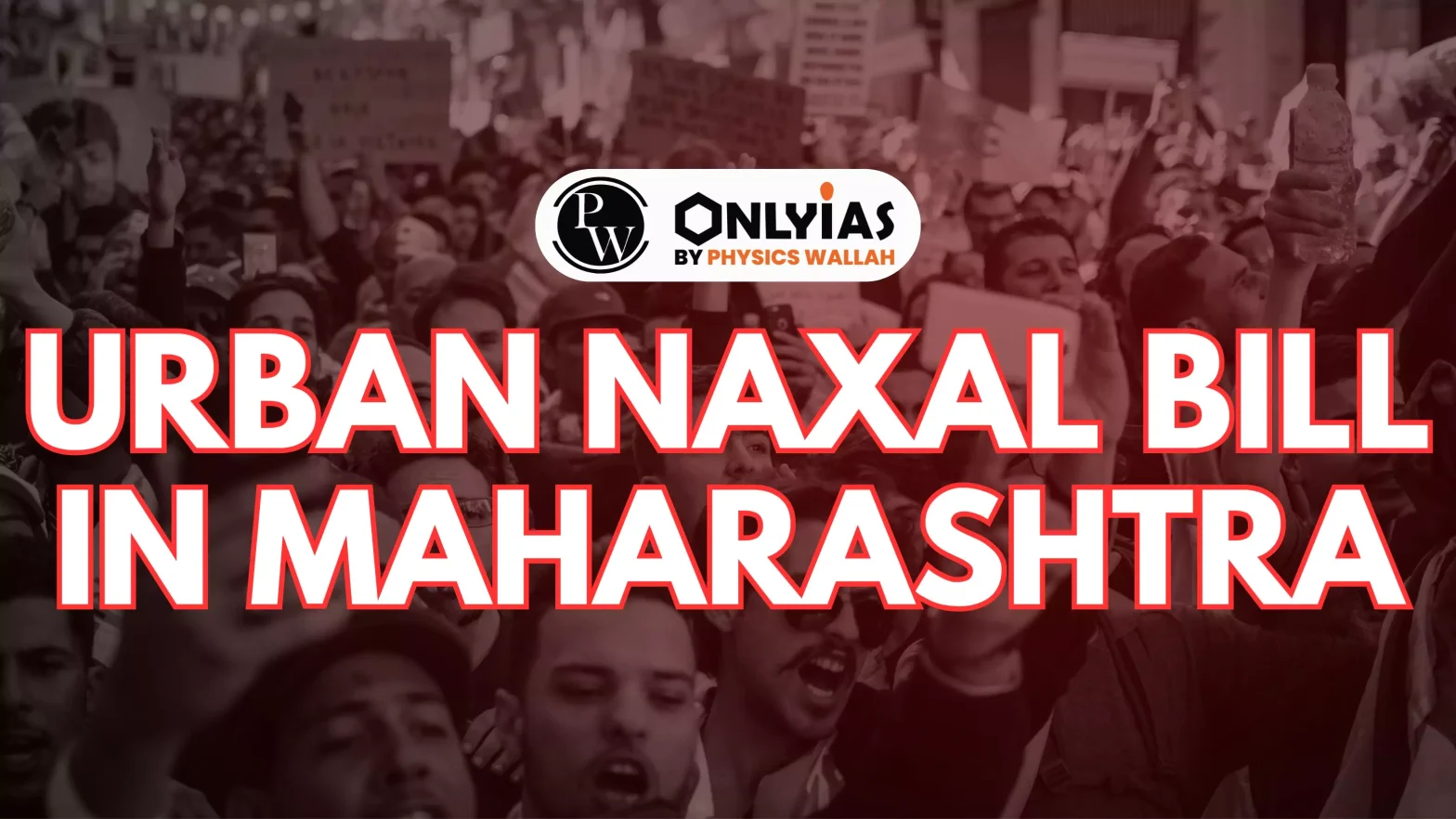The Maharashtra government has tabled a bill, the Maharashtra Special Public Security Act, 2024, which empowers the state to label any group as illegal by notification in the official Gazette.
- The Maharashtra Government has cited the growing menace of Naxalism in urban areas as a concerning issue.
| Relevancy for Prelims: Maharashtra Special Public Security Act 2024, Marxism, Leninism, Maoism, Unlawful Activities Prevention Act, National Security Act, and Public Safety Acts, etc.
Relevancy for Mains: Urban Naxalism, socio- economic factors contributing to urban naxalism, etc. |
Urban Naxalism
- The term “urban naxals” is loosely applied to individuals in urban areas who support and promote Naxalite ideology through activism and advocacy, while active naxals engage in combat in the jungles and extensive Maoist-controlled regions.
- Origin: The term ‘Urban Naxals’, which has gained currency since 2018, was first used to describe anti- establishment protesters and other dissenters in the wake of the crackdown on left-wingers and other liberals embroiled in the Elgaar Parishad case in Maharashtra.
- It is one of the two ongoing investigations related to the Bhima Koregaon violence of January 1, 2018.
- Controversy regarding the term: Some view it as a derogatory label used to stifle dissent, while others consider it a valid description of those who support Naxalite ideology in urban settings
- Manifestation of Naxalite Ideology in Urban Settings: Some of the forms of manifestation include publishing articles and books and organising seminars to propagate their ideology and criticise state policies, radicalising students, establishing a network of sympathisers, acts of sabotage, targeted violence, or symbolic attacks to disrupt state functioning, etc.
- Naxalism’s Urban Spread: A Growing Concern: Naxalism extends beyond remote areas into urban centres through Naxal frontal organisations.
Enroll now for UPSC Online Course
Ideological Background
- Ideology rooted in: The Naxalite/Maoist ideology is rooted in Marxism, Leninism, and Maoism, advocating for a revolutionary overthrow of the existing state structure through armed struggle.
- It is considered that Naxals support Maoist political sentiments and ideology.
- Maoism: Maoism is a form of communism developed by Mao Tse Tung. It is a doctrine of capturing State power through a combination of armed insurgency, mass mobilisation, and strategic alliances.
Key tenets include
- Class Struggle: Emphasis on the conflict between the proletariat (working class) and the bourgeoisie (capitalist class).
- The ultimate goal is to establish a classless society.
- Anti-State Sentiments: The state is viewed as an instrument of bourgeois oppression. Therefore, dismantling the current state structure is essential for achieving true democracy and social justice.
- Self-Reliance and Guerrilla Warfare: Promotes self-sufficient, decentralised communes and the use of guerrilla tactics to combat state forces, primarily operating from rural and forested regions.
Maharashtra Special Public Security Act 2024
- Objectives: Aim to address the growing menace of Naxalism in urban areas.
Some Key Provisions of the Maharashtra Special Public Security Bill:
- Definition of Organisation: According to the draft bill, ‘organisation’ is defined as any group of individuals, whether identified by a specific name or not, and regardless of whether they operate under a formal written constitution or not.
- Definition of Unlawful Activity: The bill broadly defines “unlawful activity” to include actions that threaten public order, peace, and tranquillity or interfere with the administration of law and established institutions.
- It encompasses indulging in or promoting violence, vandalism, or acts causing public fear and apprehension.
- Additionally, it covers activities that encourage disobedience to established laws and authorities, aiming to maintain societal harmony and prevent disturbances to public order.
- Seizure of Assets: The draft bill allows the state to seize movable property, including money, securities, and other assets within premises.
- This law allows police to check premises for literature related to “urban Naxalism.” If found, such literature can be seized.
- Confiscated assets can be forfeited to the government if the District Magistrate or Commissioner of Police believes they could support unlawful organisation activities.
- Non-bailable offences: All offences under this law will be cognizable and non-bailable and will be investigated by a police officer, not below the rank of a Sub-Inspector.
- Ministry of Home Affairs (МНА) Recommendations: Urges Maoist-affected states to enact legislation to curb unlawful activities and provides guidelines for security-related expenditure.
Criticism against the Maharashtra Special Public Security Act 2024
- Broad Definitions: Critics argue that “organisation” and “unlawful activity” are overly broad and vague, potentially allowing for arbitrary or politically motivated targeting of individuals and groups.
- Impact on Dissent: There are fears that the act could stifle dissent and legitimate forms of protest by categorising them as unlawful activities.
- The vague drafting suggests it intends to instil fear among human rights activists and restrict their activities, potentially targeting any citizen advocating for systemic change.
- Curtailment of freedom of Rights: The Bill is criticised for suppressing freedom of speech and expression and hindering non-violent protests against oppression.
- Overlapping Provisions: Critics argue that its provisions largely overlap with existing laws like the Unlawful Activities Prevention Act, National Security Act, and Public Safety Acts.
- Legal and Human Rights Concerns: There are concerns about potential violations of due process rights, including the right to a fair trial and protection against arbitrary detention.
Enroll now for UPSC Online Classes
Conclusion
- The Maharashtra Urban Naxal Bill, 2024 represents a contentious step towards addressing perceived threats of Naxalism in urban areas.
- Critics argue it risks infringing on civil liberties and stifling dissent, while proponents view it as necessary for maintaining public order and security in the state.
- Its implementation and impact will likely continue to spark debate over the balance between security measures and fundamental rights.
![]() 15 Jul 2024
15 Jul 2024
